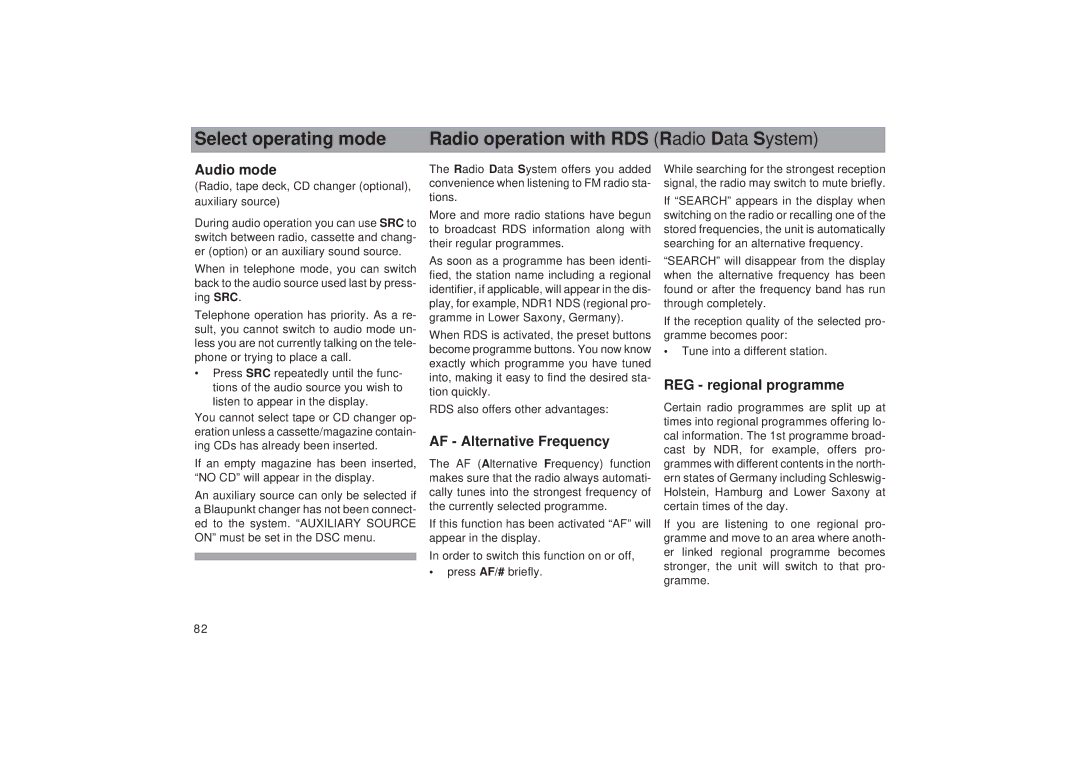Select operating mode | Radio operation with RDS (Radio Data System) |
|
|
Audio mode
(Radio, tape deck, CD changer (optional), auxiliary source)
During audio operation you can use SRC to switch between radio, cassette and chang- er (option) or an auxiliary sound source.
When in telephone mode, you can switch back to the audio source used last by press- ing SRC.
Telephone operation has priority. As a re- sult, you cannot switch to audio mode un- less you are not currently talking on the tele- phone or trying to place a call.
•Press SRC repeatedly until the func- tions of the audio source you wish to listen to appear in the display.
You cannot select tape or CD changer op- eration unless a cassette/magazine contain- ing CDs has already been inserted.
If an empty magazine has been inserted, “NO CD” will appear in the display.
An auxiliary source can only be selected if a Blaupunkt changer has not been connect- ed to the system. “AUXILIARY SOURCE ON” must be set in the DSC menu.
The Radio Data System offers you added convenience when listening to FM radio sta- tions.
More and more radio stations have begun to broadcast RDS information along with their regular programmes.
As soon as a programme has been identi- fied, the station name including a regional identifier, if applicable, will appear in the dis- play, for example, NDR1 NDS (regional pro- gramme in Lower Saxony, Germany).
When RDS is activated, the preset buttons become programme buttons. You now know exactly which programme you have tuned into, making it easy to find the desired sta- tion quickly.
RDS also offers other advantages:
AF - Alternative Frequency
The AF (Alternative Frequency) function makes sure that the radio always automati- cally tunes into the strongest frequency of the currently selected programme.
If this function has been activated “AF” will appear in the display.
In order to switch this function on or off,
•press AF/# briefly.
While searching for the strongest reception signal, the radio may switch to mute briefly.
If “SEARCH” appears in the display when switching on the radio or recalling one of the stored frequencies, the unit is automatically searching for an alternative frequency.
“SEARCH” will disappear from the display when the alternative frequency has been found or after the frequency band has run through completely.
If the reception quality of the selected pro- gramme becomes poor:
•Tune into a different station.
REG - regional programme
Certain radio programmes are split up at times into regional programmes offering lo- cal information. The 1st programme broad- cast by NDR, for example, offers pro- grammes with different contents in the north- ern states of Germany including Schleswig- Holstein, Hamburg and Lower Saxony at certain times of the day.
If you are listening to one regional pro- gramme and move to an area where anoth- er linked regional programme becomes stronger, the unit will switch to that pro- gramme.
82
